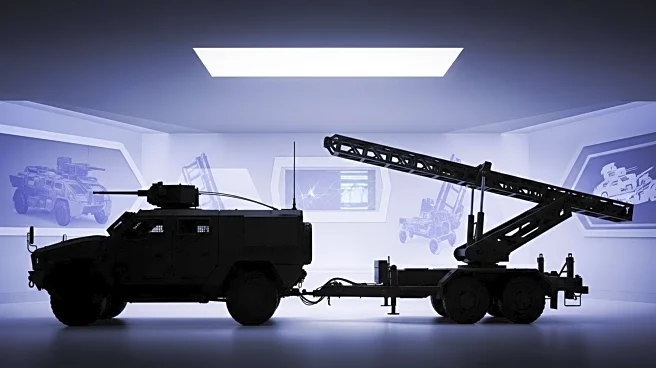What's Happening?
Contact Corporation has announced the launch of a new Joint Light Tactical Vehicle (JLTV) Trailer Pallet Mast System at the Association of the United States Army (AUSA) event. This innovative system features on-board power, eliminating the need for separate genset vehicles, thus enhancing mission success rates and protecting U.S. warfighters. The system expands the usable deck space of the JLTV Trailer by approximately 200%, accommodating mast systems with two 10kW LiquidPiston gensets. The LiquidPiston gensets are ultra-compact and efficient, providing operational energy in contested logistics environments. The system will be showcased at Contact's booth during the AUSA event.
Why It's Important?
The introduction of Contact Corporation's JLTV Trailer Mast System represents a significant advancement in military communications technology. By integrating on-board power, the system improves mobility and efficiency for military operations, potentially reducing logistical challenges and enhancing communication capabilities in the field. This development aligns with the Department of War's network modernization priorities, supporting warfighters with reliable and rapid-deployable communication systems. The collaboration with LiquidPiston highlights the importance of innovative power solutions in modern military applications, which could influence future defense procurement strategies.
What's Next?
Contact Corporation will continue to demonstrate the capabilities of the JLTV Trailer Mast System at the AUSA event, potentially attracting interest from military and government agencies. The successful deployment of this system could lead to further collaborations with technology providers like LiquidPiston, driving advancements in military communications infrastructure. Stakeholders will likely monitor the system's performance and consider its integration into broader defense strategies, impacting future investments in mobile communication technologies.
Beyond the Headlines
The development of advanced communication systems like the JLTV Trailer Mast System raises questions about the ethical use of technology in warfare. As military operations become increasingly reliant on sophisticated communication networks, discussions around cybersecurity and data protection may intensify. Additionally, the environmental impact of deploying such systems could prompt considerations for sustainable practices in defense technology development.











